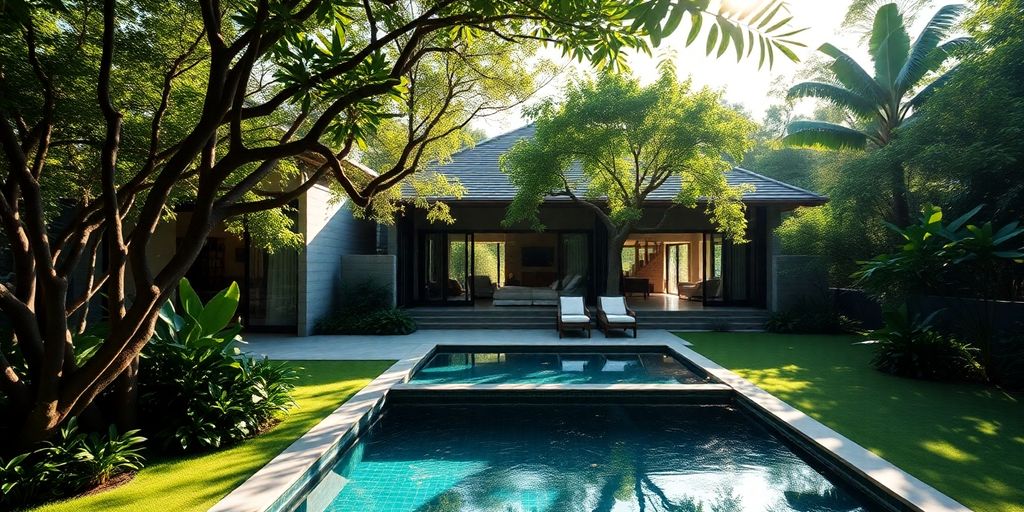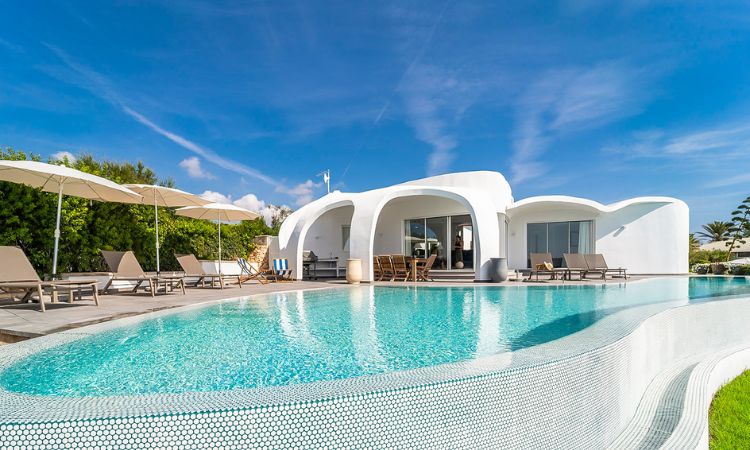Research suggests that in 2025, privacy has become a core component of luxury travel, as affluent travelers increasingly prioritize seclusion, anonymity, and personalized experiences over traditional opulence.

This trend appears driven by factors like post-pandemic recovery, rising data security concerns, and a shift toward meaningful, low-key adventures, though it may involve trade-offs such as higher costs and limited social opportunities.
Evidence leans toward privacy enhancing traveler satisfaction, with surveys indicating over 85% of high-net-worth individuals valuing it highly, but opinions vary on whether it fully redefines luxury for everyone.
Key Statistics: The Privacy Premium
Why Privacy Defines Luxury Travel in 2025
In an era where constant connectivity and social media exposure dominate daily life, privacy offers a rare escape, allowing travelers to recharge without distractions. This shift is evident in the move away from crowded hotspots toward secluded destinations and experiences, where the ability to disconnect—such as through digital detoxes or off-grid retreats—provides a sense of exclusivity and peace.

For instance, "stealth travel" to secret European locales helps the wealthy avoid influencer-filled spots like Ibiza or Mykonos, emphasizing anonymity as a premium feature. While not without debate, this approach aligns with broader wellness and sustainability goals, making privacy feel like an essential, approachable indulgence rather than an extravagant add-on.
The Stealth Travel Movement
- Secret European destinations replacing mainstream hotspots
- Private villa rentals in undiscovered locations
- Exclusive access to cultural sites after hours
- Anonymous booking platforms for celebrity travelers
- Off-grid luxury experiences in remote locations
Key Drivers Behind the Privacy Revolution
Post-Pandemic Recovery and Wellness Focus
The lingering effects of global lockdowns have heightened the value of personal space and mental reset. Travelers now seek "coolcations" in serene, cold destinations like Norway or Antarctica for their crowd-free landscapes and stillness, aligning with wellness trends such as silent meditation retreats in Bhutan or digital detox cabins.
• Norwegian Fjords (Silent Retreats)
• Bhutan (Meditation Escapes)
• Antarctica (Ultimate Isolation)
• Scottish Highlands (Digital Detox)
Heightened Security and Anonymity Concerns
In a world of data breaches and increased public scrutiny, especially for celebrities and executives, privacy offers protection. High-profile individuals opt for anonymous travel to avoid paparazzi or leaks, with features like advanced flight tracking controls and encrypted communications becoming standard.
"Privacy isn't just a perk; it's the point in ultra-high-end travel."
Shift Toward Meaningful, Personalized Experiences
Luxury is redefined as hyper-personalized, moving beyond cookie-cutter itineraries to bespoke adventures inspired by personal interests, such as ancestral roots or favorite novels. This includes sustainable elements, like eco-lodges with zero-waste policies, where privacy enhances environmental immersion without tourist interference.
Backlash Against Crowded, Influencer-Driven Destinations
Traditional spots like St. Tropez or Mykonos have lost appeal due to overexposure, prompting "stealth travel" to secret European regions where luxury rises without mass awareness. This trend underscores privacy as a marker of sophistication, as "true status is defined by access to rare experiences."
Private Aviation: The Sky-High Privacy Experience

Qatar Airways Qsuite Next Gen: Redefining Business Class Privacy
Qatar Airways' Qsuite Next Gen features taller privacy dividers, 4K screens, and "Make My Bed" buttons for ultimate in-flight seclusion. Similarly, private jets with biometric check-ins and customizable cabins offer discretion, partnering with remote resorts for end-to-end privacy.
Private Jet Privacy Features:
- Biometric security systems
- Encrypted communication networks
- Custom cabin configurations
- Private terminal access
- Flexible scheduling for anonymity

Exclusive Villa and Resort Destinations: Privacy Perfected
High-end villas in St. Barts, Amalfi Coast, Bali, and Ibiza provide secluded estates with private beaches, butlers, and sustainable designs. Spring Break 2025 saw a boom in luxury villa rentals in Hawaii and Turks & Caicos for family privacy.

St. Barts Luxury Villas
Private beaches and bespoke services

Spring Break Exclusives
Crowd-free luxury getaways
:max_bytes(150000):strip_icc()/TAL-header-exterior-panorama-villas-joshua-tree-JOSHTREEVILLAS0725-2312458c7432464aa9af38b4458a9c81.jpg)
Desert Privacy Escapes
10-acre private desert retreats
Caribbean Privacy Havens
- Turks & Caicos - Private beach estates
- St. Barts - Exclusive villa compounds
- Barbados - Secluded luxury resorts
- Antigua - Private island experiences
European Stealth Destinations
- Slovenia - Hidden luxury retreats
- Scottish Highlands - Remote castles
- Norwegian Fjords - Silent sanctuaries
- Portuguese Azores - Volcanic privacy
Private Islands: The Ultimate Privacy Experience
Private islands represent the pinnacle of exclusive travel, offering complete isolation and personalized luxury experiences. These destinations provide the ultimate privacy where guests can enjoy pristine beaches, custom services, and absolute seclusion from the outside world.

What Makes Private Islands Special:
- Complete exclusivity with no other guests
- Private beaches and pristine natural environments
- Customized dining and entertainment programs
- Dedicated staff for personalized service
- Water sports and activities on demand
- Helicopter or seaplane access for maximum privacy


World's Most Exclusive Private Island Resorts
25 luxury villas across 3,500 acres
35 eco-luxury villas on Tetiaroa Atoll
Exclusive overwater bungalows
Market Statistics and Business Impact
The luxury travel market is booming, projected to grow from USD 1.7 trillion in 2024 to USD 2.4 trillion by 2034 at a 5% CAGR, with privacy-focused segments driving much of this expansion. In the U.S., the market is expected to reach USD 832.7 billion by 2033 at 8.42% CAGR, fueled by demands for exclusive villas and jets.
Privacy Premium Economics
Companies like SmartFlyer and Airvoir capitalize on this by offering bespoke services, while reports from Skift and Fortune Business Insights highlight privacy as a key growth driver. Economically, privacy commands premiums, as "private is the new premium," attracting UHNWIs who value control over visibility.
Technology Enablers: Making Privacy Seamless
AI-Powered Personalization
Advanced algorithms anticipate guest needs while maintaining strict data security protocols and privacy standards.
Biometric Security Systems
Fingerprint and facial recognition technology enables seamless, contactless check-ins while maintaining anonymity.
Smart Villa Integration
IoT-enabled properties offer voice control, automated services, and predictive maintenance without compromising guest privacy.
Counterarguments and Potential Drawbacks
The Cost Factor
While privacy is celebrated, it's not without criticism. Some argue it's overrated, leading to isolation and missing the social vibrancy of group travel. Drawbacks include exorbitant costs—private tours can be 2-5x more expensive—and increased planning burden, potentially exhausting for spontaneous travelers.
Social Isolation Concerns
Excessive focus on privacy may lead to missing authentic cultural interactions and the serendipitous encounters that make travel memorable. Some travelers value the energy and connections that come from shared experiences.
Sustainability and Inequality Issues
In controversial views, excessive privacy may exacerbate inequality, limiting access to shared cultural sites, or contradict sustainability if it promotes resource-intensive isolation. However, balanced perspectives suggest hybrid models, like small-group exclusives, could mitigate these issues.
Future Predictions: The Privacy Revolution Continues

Looking beyond 2025, privacy will likely integrate deeper with sustainability and technology, such as AI-driven wellness retreats and eco-private islands. Market growth at 7.4% CAGR to USD 2.1 trillion by 2035 indicates continued dominance, with emerging destinations like Slovenia offering quiet discovery.
The Quiet Revolution
Experts predict a "quiet revolution" where privacy becomes standard, but adaptable to diverse preferences, ensuring luxury remains inclusive yet elite. This evolution will be characterized by:
- Integration of AI and wellness technologies
- Sustainable private island developments
- Emergence of new stealth destinations
- Hybrid privacy-social experiences
- Advanced biometric and encryption systems
Market Projections Through 2035
Experience Privacy-First Luxury Travel
Discover exclusive destinations and private experiences that redefine luxury travel in 2025